WHO calls for unhindered humanitarian access to all Syrians and support for health system resilience
Within the context of the Brussels conference on Syria, WHO emphasizes that health is a human right that must be respected by all parties to the conflict, that attacks on health workers and facilities must stop, and that there must be adequate investments in the health sector
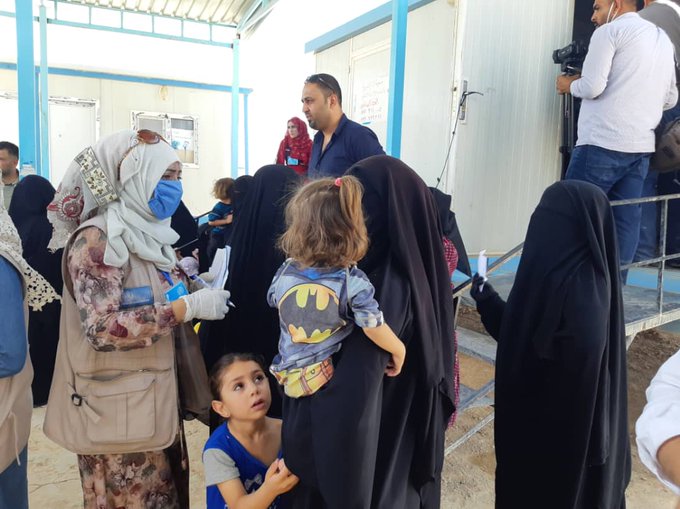 30 June 2020 – As the crisis in Syria enters its tenth year, WHO calls on parties to the conflict and the international donor community to put the health and well-being of the Syrian people first. Sustained access via all modalities and sufficient resources are required to enable WHO and partners to meet the health needs of all people across the country.
30 June 2020 – As the crisis in Syria enters its tenth year, WHO calls on parties to the conflict and the international donor community to put the health and well-being of the Syrian people first. Sustained access via all modalities and sufficient resources are required to enable WHO and partners to meet the health needs of all people across the country.
Syrians who survived a decade of war are now facing an unprecedented socioeconomic crisis and a potentially disastrous COVID-19 pandemic, in addition to other public health risks. More than 12 million people in Syria are in need of humanitarian aid, including over 6 million internally displaced people living in camps or in camp-like settlements.
Although there are relatively few cases of COVID-19 across the country – 269 cases as of June 30 – official figures likely represent a significant underestimate of the true number. Syria is at risk of a substantial acceleration of the outbreak, due to its weakened health system and the difficulties in applying “lockdown” measures in the context of an economic crisis. Nonetheless, there is still an opportunity to prevent and mitigate the impact of the outbreak, by further expanding preparedness and response measures, especially at subnational level.
Displaced Syrians, particularly in the northeast and northwest of the country, live under conditions making them particularly vulnerable to respiratory infections such as COVID-19. Many live in overcrowded living conditions, and also face physical and mental stress and deprivation due to lack of housing, food and clean water. The humanitarian situation in northwest Syria remains one of the most acute and severe in the world with over 2.8 million people dependent on humanitarian assistance supplied almost entirely via cross-border operations from southern Turkey.
Across the country, deteriorating conditions continue to place significant stress on the Syrian population, including increased prevalence of chronic diseases and mental health conditions, and increased rates of malnutrition. Many people live below the poverty line, further increasing their health needs and risks. But it is challenging to meet the health needs of Syrians – especially the most vulnerable – when less than half of health facilities are fully functional and there are such major shortages of health care workers. Health workers are describing an immense strain on services with only the most urgent cases being treated.
Attacks on health care continue, and the risk of ongoing ceasefire violations are of great concern in the northwestern part of the country. This year alone, 16 attacks on health care have been reported, in which 10 people died and 36 were injured, including 6 health care workers.
WHO continues its lifesaving work with partners inside Syria and cross-border from Turkey to respond to urgent health needs, and repeats calls by the United Nations for an immediate ceasefire, easing of sanctions that impede the COVID-19 response, and for a political solution to the conflict, along with the increased investments in health and health system resilience to protect the lives of millions of vulnerable men, women and children. The people of Syria cannot have a future without proper health care.
UNICEF and WHO support national immunization campaign in Syria amid COVID-19 pandemic
More than 210 000 children under the age of 5 across Syria catch up on their vaccines
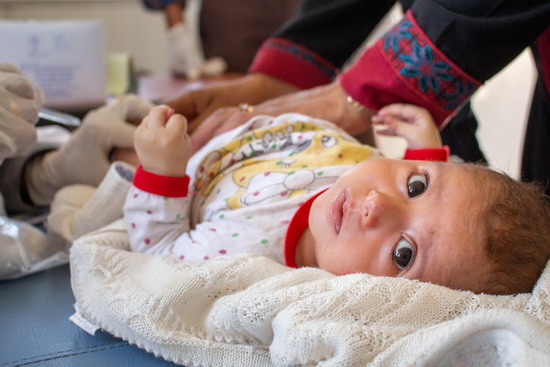 Damascus, 29 June 2020 – With an aim to maintain vital routine immunization services amid the COVID-19 pandemic, a national immunization campaign supported by WHO and UNICEF has concluded across Syria. During the 5-day campaign, implemented by the Syrian Ministry of Health, health workers checked the vaccination status of more than 900 000 children and vaccinated more than 210 100 children to ensure they are caught up with the routine immunization schedule.
Damascus, 29 June 2020 – With an aim to maintain vital routine immunization services amid the COVID-19 pandemic, a national immunization campaign supported by WHO and UNICEF has concluded across Syria. During the 5-day campaign, implemented by the Syrian Ministry of Health, health workers checked the vaccination status of more than 900 000 children and vaccinated more than 210 100 children to ensure they are caught up with the routine immunization schedule.
Over 1000 health centres, 545 mobile teams, 666 temporary vaccination posts and more than 8000 health workers were mobilized for the campaign. In-line with WHO global guidelines, health workers were trained on preventative and precautionary measures, including disinfection, hygiene protocols and overcrowding prevention. In addition, they were provided with personal protection equipment for their safety and that of children and caregivers during the immunization campaign.
“No child should miss out on their vaccinations, now more than ever” says Fran Equiza, UNICEF Representative in Syria, “These are difficult times, parents may feel overwhelmed with worries. Our message to them is clear: make sure your kids receive their routine immunizations to avoid vaccine-preventable diseases. When vaccination coverage goes down, more outbreaks will occur, including of life-threatening diseases like measles and polio.”
According to WHO, there has been about a 5% reduction in vaccination coverage in the first half of 2020. This has occurred mainly as a result of challenges inflicted by the COVID-19 pandemic, including limited access to health centres due to movement restrictions, as well as fear of contracting the virus. WHO continuously asserts its commitment to provide support to save the lives of children and protect them against poor health outcomes, including the threat of vaccine-preventable diseases.
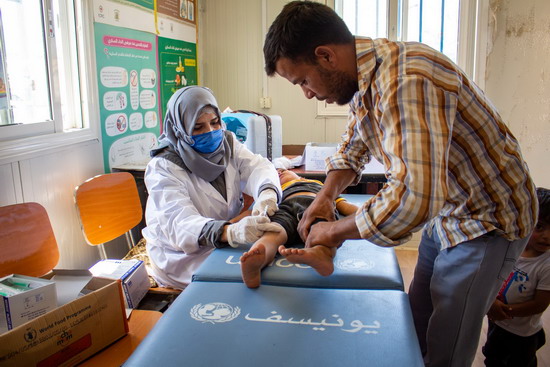 “I would like to thank health professionals for supporting such a significant programme at such critical time. I would like to recognize the enormous competency health vaccinators have exhibited during this mission; and their commitment to protect children in Syria against vaccine preventable diseases and provide them with immunization to enjoy a disease-free childhood. These days, more than ever, the health of all depends on the courage and dedication of frontline heroes. Our deepest gratitude goes to the public health workforce,” said Dr Akjemal Magtymova, WHO Representative in Syria.
“I would like to thank health professionals for supporting such a significant programme at such critical time. I would like to recognize the enormous competency health vaccinators have exhibited during this mission; and their commitment to protect children in Syria against vaccine preventable diseases and provide them with immunization to enjoy a disease-free childhood. These days, more than ever, the health of all depends on the courage and dedication of frontline heroes. Our deepest gratitude goes to the public health workforce,” said Dr Akjemal Magtymova, WHO Representative in Syria.
WHO and UNICEF noted in a joint health brief published this month that health care disruptions due to COVID-19 could have a devastating impact on child mortality in the Middle East and North Africa. The full and safe resumption of immunization campaigns as well as nutrition services, while following strict precautionary measures for infection prevention, are key to helping tens of thousands of children reach their fifth year of age in good health.
Photos of the campaign can be found here and here
For more information:
Salam Al-Janabi
UNICEF Syria
Damascus
+963-950044371
Inas Hamam
WHO Regional Office
Cairo
+20 01000 157 385
About UNICEF
UNICEF works in some of the world’s toughest places, to reach the world’s most disadvantaged children. Across more than 190 countries and territories, we work for every child, everywhere, to build a better world for everyone.
For more information about UNICEF and our work for children, visit www.unicef.org/mena
About WHO
Under its vision of Universal Health Coverage and the right to health care for all people, everywhere, WHO works worldwide to promote health, keep the world safe, and serve the vulnerable. Its goal is to ensure that a billion more people have universal health coverage, to protect a billion more people from health emergencies, and provide a further billion people with better health and well-being.
WHO delivers health supplies by road to northeast Syria
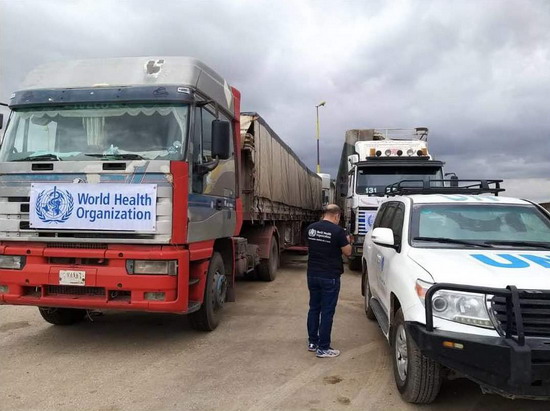 For the first time in 2 years, WHO has been able to deliver medical supplies by road to northeast Syria
For the first time in 2 years, WHO has been able to deliver medical supplies by road to northeast Syria
1 June 2020 — The World Health Organization (WHO) has delivered 20 tons of medical supplies to Al-Qamishli in northeast Syria, the second delivery of its kind in 2 weeks. The supplies will be distributed to public health facilities in Al-Hasakeh, Ar-Raqqa and Deir-Ez-Zor governorates.
The 2 shipments contain equipment and medical supplies to treat many diseases, including COVID-19. The delivery also included basic and mobile X-ray machines, intensive care beds and hospital beds, operating tables, incubators, oxygen concentrator, cholera kits, wheelchairs and a diesel generator.
“During the last 2 weeks, WHO delivered over 55 tons of medical supplies by road. These were the first road deliveries to Al-Hasakeh governorate in northeast Syria in the past 2 years,” said Dr Akjemal Magtymova, WHO Representative in Syria.
“These are challenging times when the focus of the global public health community is on responding to the COVID-19 pandemic,” she continued. “While joining global and national efforts to fight the pandemic, WHO also continues to support basic health services and serve at-risk communities in the northeast, as well as across Syria.”
Due to the Syrian conflict, road shipments have been halted since May 2018. Airlifting relief shipments was the alternative, sometimes costing as much as 20 times the road shipments.
“The road shipments delivered this month represent progress which should be applauded,” says Dr Magtymova. “WHO remains committed to delivering the most essential medical supplies to vulnerable and in-need communities.”
The medical supplies were procured using generous contributions from the Government of Norway and Office of U.S. Foreign Disaster Assistance (OFDA).
WHO welcomes Dr Akjemal Magtymova as WHO Representative in Syria
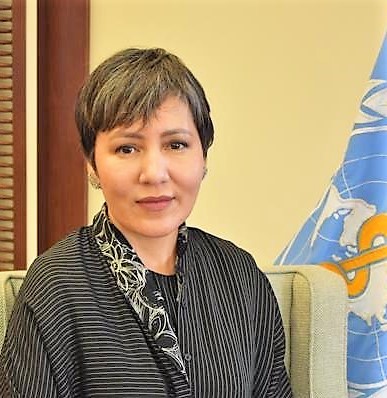 Dr Akjemal Magtymova, WHO Representative to the Syrian Arab Republic
Dr Akjemal Magtymova, WHO Representative to the Syrian Arab Republic
7 May 2020 – WHO welcomes Dr Akjemal Magtymova as incoming WHO Representative to the Syrian Arab Republic. Dr Magtymova joins WHO Syria at a critical time, with multiple public health threats threatening the well-being of millions of Syrians. An outbreak of COVID-19 in the country has placed additional pressure on a health system ravaged by years of war.
“I am delighted to join the WHO Syria team to support its mission. What we do is noble, and I have no doubt that it is driven by this team’s passion to help others. Each of us has a greater reach beyond the individual people we serve, impacting whole populations. WHO is a global leader in public health, and what makes WHO is us, its staff who remain committed to overcoming all challenges and succeeding. We at WHO embrace partnerships; we do not compete for the prestige or the niche, but we gain respect by competency, professionalism and the results we accomplish,” said Dr Magtymova as she started her new assignment.
Nine years of conflict in Syria have resulted in a severely damaged health system and significant shortages in health workers. Vulnerable families continue to rely on essential life-saving aid. Almost 6.1 million Syrians continue to be internally displaced and often lack adequate essential services, including water and sanitation. An estimated 11 million people require humanitarian assistance in 2020, with up to 5 million people in acute need.
Recently, Syria also reported its first cases of COVID-19, with 44 cases now confirmed in the country. WHO classifies Syria one of the high-risk countries globally and a priority country in the Eastern Mediterranean Region.
“We are in the middle of the battle of our lives, and I consider WHO and its partners on the frontlines, alongside surgeons and those working in hospitals. This battle requires our full energy. The world is going to change, and we are writing history. Each and every one of us, individually and collectively, are responsible for its script – and we have a key opportunity now to change the course of many lives in Syria, and achieve something we can be proud of,” said Dr Magtymova.
Born and raised in Turkmenistan, Dr Magtymova has dedicated the past 20 years of her career to international humanitarian aid and development. Prior to her new assignment in Syria, Dr Magtymova was WHO Representative in Oman, where she achieved significant goals within WHO’s “Health for All” vision. Dr Magtymova also served as Deputy Head and Emergency Coordinator of WHO’s Office in Yemen and held several posts in WHO’s South-East Asia Region, where she covered both development and humanitarian programmes.
Dr Magtymova is an MD and holds two Master’s Degrees; an MSc from London School of Hygiene and Tropical Medicine, and an MA from Fletcher School of Law and Diplomacy.








